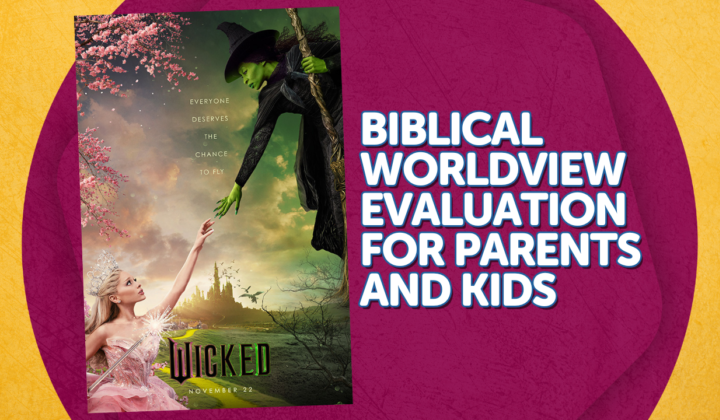Learn more about the journey that led to us equipping kids to carefully evaluate every idea they encounter.
Meet Elizabeth Urbanowicz, the classroom teacher who developed these materials for her students.
Meet members of our team who have contributed to curriculum development.
Hear from real users of the Foundation Curriculum.
Learn what we believe about God, Jesus, Scripture, and more.
The King of Kings: A Biblical Worldview Evaluation for Parents and Kids
Hello friends. On today's podcast, we are going to be talking about the movie The King of Kings. As many of you are probably aware, this is a movie that was recently released in theaters, and it chronicles the life of Jesus. This past weekend I went to see it with a family from church, and I thought it would be a great opportunity for us to talk through some of the positive elements of the movie, some of the negative elements, and some discussion points you can have with your kids if you take them to see it.
Typically, on the Foundation Worldview Podcast, we're answering your questions to help you equip the children God has placed in your care to carefully evaluate every idea they encounter and understand the truth of the biblical worldview. I'm your host, Elizabeth Urbanowicz, and I'm thrilled that you've joined me today.
When I went to see this movie, one thing I wasn’t aware of—but I think is really helpful context—is that the movie is not based off of the Gospels. It’s actually based off of a short story written by Charles Dickens called The Life of Our Lord. The entire movie is narrated by Charles Dickens and told as a story he’s telling to his youngest son. That’s really important context because I didn’t realize the gospel story would be told through the eyes of Charles Dickens.
For the rest of this podcast, I’ll outline the positive elements of the movie, the negative elements, and then some discussion points you can use with your children if you choose to see the film. I’ve mentioned in past movie reviews that I’m never going to encourage you to take your child to see a certain movie. While I may discourage you from seeing one, I won’t encourage you to go because engaging with entertainment is a matter of conscience. So even if I think a movie could be beneficial, that decision is still yours as a parent.
Positive Elements
As I watched the movie, I thought they did a good job in many of the storylines they portrayed. While not everything was accurate, most of the narratives stuck closely to the biblical text. On a personal note, it was exciting to see biblical narratives on the big screen. Most of what we see—either at home or in theaters—are not biblical stories. So it was encouraging to see these stories brought to life.
The movie did a good job immersing children in the biblical narratives. I went with a family who has a three-and-a-half-year-old daughter, and she asked her parents tons of questions throughout. It was great to see her engaging with what was happening and asking biblically based questions.
I also thought the animation quality was pretty good for a smaller studio like Angel Studios. It’s not Pixar-level animation, but it was decent.
Theologically, the film made it clear that Jesus is the Son of God—not just an ordinary man. That was reinforced multiple times. They also portrayed difficult parts of the story well. For example, when Peter cut off the ear of the soldier, they showed the event in a way that wasn’t scary—no blood, just a reaction and then the healing.
Similarly, during the flogging and crucifixion scenes, they handled it with sensitivity for young viewers. You saw soldiers with whips and nails, but not graphic depictions. They blurred out most of the imagery, especially during Jesus’s time on the cross, focusing only on faces. This was wise given the intended audience.
Negative Elements
Now onto the negatives—some minor, some more significant.
On the minor side: I thought Oscar Isaac, who voiced Jesus, wasn’t the best choice. He sounded unengaged and even half-asleep at times. The father in the family I went with said the same thing. Some of the disciples had strong New Jersey accents, which felt out of place. The animation also made most characters, including Jesus, Mary, and Joseph, look European rather than Middle Eastern, which isn’t historically accurate.
They included the story of the woman caught in adultery, which was well done, but I thought it was an interesting choice for a children’s movie since many kids don’t know what adultery is. Also, that narrative is noted in most Bibles as not being in the earliest manuscripts, so it may not have originally been part of the Gospels.
In the scene where Jesus casts demons into pigs, the overhead camera angle showing the pigs falling off a cliff felt like an odd choice for children. And there was a strange moment where Jesus picks up a cat and then turns into Charles Dickens. That was confusing and unnecessary.
Now, more importantly, the film never clearly states that Jesus is God. It refers to Him as the Son of God but omits His own claims of divinity—such as when He says, "I and the Father are one." They also misrepresented the purpose of His miracles. The film says they were to prove the power of faith. While Jesus did acknowledge people’s faith when performing miracles, Scripture shows that His miracles were signs proving He is the Messiah.
Lastly, the resurrection was underplayed. Jesus simply walks out of the tomb, touches the boy’s face, and walks away. Dickens then says, “We are alive again because He has arisen.” That’s a lovely sentiment but makes it sound like everyone has life in Jesus just because He rose. Then after a long countdown post-credits, I expected a gospel presentation—but it was just a donation pitch for the film. That felt like a letdown.
Discussion Points for Kids
If you take your children to see The King of Kings, it provides an excellent opportunity to help them think critically and biblically. Don’t just tell them what was inaccurate—go to Scripture with them. Let’s train them to compare everything they hear with God’s Word.
1. Purpose of Jesus’s Miracles
Ask: “The movie said Jesus performed miracles to prove the power of faith. What does the Bible say?”
Look at:
- Matthew 8:16–17 – Jesus fulfilled Isaiah’s prophecy by healing.
- Matthew 11:2–6 – Jesus points to miracles as proof He is the Christ.
- Matthew 12:9–21 – Miracles fulfilled prophecy about the Messiah.
Conclusion: Jesus’s miracles proved He is the Messiah, not just the power of generic faith.
2. Is Jesus God?
Ask: “The movie says the Pharisees didn’t like Jesus because He was close to God. Is that accurate?”
Look at:
- John 8:56–59 – Jesus uses the name “I Am,” claiming to be God.
- Exodus 3:13–14 – God’s name is “I Am.”
- John 10:27–33 – The Jews try to stone Jesus for claiming to be God.
Conclusion: Jesus didn’t just claim closeness to God—He claimed to be God.
3. Who Has Life in Jesus?
Ask: “The movie said we’re all alive because Jesus rose. Is that true?”
Look at:
- John 3:16–18 – Eternal life is for whoever believes in Him.
- 1 John 5:11–12 – Only those who have the Son have life.
Conclusion: New life is offered to all, but only those who believe in Jesus receive it.
If you walk through these three topics with your kids, you’ll be helping them learn how to test everything against the truth of Scripture.
As I mentioned at the beginning, I won’t tell you whether to take your kids to see this movie—that’s your decision. But if you do, it opens up rich opportunities for discipleship and biblical thinking.
That’s a wrap for this episode. If you haven’t yet subscribed to our podcast, please do so. And if you have a question you’d like answered on a future episode, head over to foundationworldview.com/podcast.
My prayer is that no matter the situation you and your children find yourselves in, you would trust that God is working all things together for your good—forming you more into the image of His Son. See you next time!
Related Posts and insights

Santa Claus, The Easter Bunny, The Tooth Fairy, and the Truth
If we are teaching our children about objective truth, evaluating claims and understanding that the biblical worldview is true, is it harmful or antithetical if we're encouraging belief in Santa Claus or the Easter Bunny or the Tooth Fairy?

Should Christians Observe Advent, Lent, and Holy Week?
Is observing Advent, Lent, or Holy Week appropriate for evangelical Christians? In this episode, Elizabeth Urbanowicz explores whether following the church calendar aligns with a biblical worldview. She provides practical suggestions for incorporating these traditions into family life to help focus children's hearts and minds on the gospel. Whether you're familiar with these rhythms or curious about their benefits, join us for a thoughtful discussion that equips parents to lead their families in intentional discipleship.

Wicked: A Biblical Worldview Evaluation for Parents and Kids
Should Christians take their kids to see Wicked? In this episode, Elizabeth Urbanowicz evaluates the popular musical-turned-movie, exploring its postmodern themes and providing practical ways to discuss its messages with your children. Learn how to use movies like Wicked to help your kids think critically and biblically about what they see and hear.



